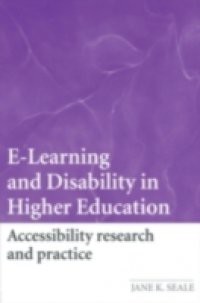Most practitioners know that they should make e-learning accessible to students with disabilities, yet it is not always clear exactly how this should be done. E-Learning and Disability in Higher Education evaluates current practice and provision and explores the tools, methods and approaches available for improving accessible practice. Examining the social, educational and political background behind making e-learning accessible in higher and further education, this book considers the role of and provides advice for, the key stake-holders involved in e-learning provision: lecturers, learning technologists, student support services, staff developers and senior managers. Key topics covered include: the opportunites that e-learning can offer students with disabilities the impact of accessibility legislation, guidelines and standards on current e-learning practices the reliability and validity of accessibility related evaluation and repair tools practical guidelines for 'best practice' in providing accessible e-learning experiences. E-Learning and Disability in Higher Education is valuable reading for all practitioners and researchers involved in the design and delivery of accessible e-learning in higher, further and distance education.

